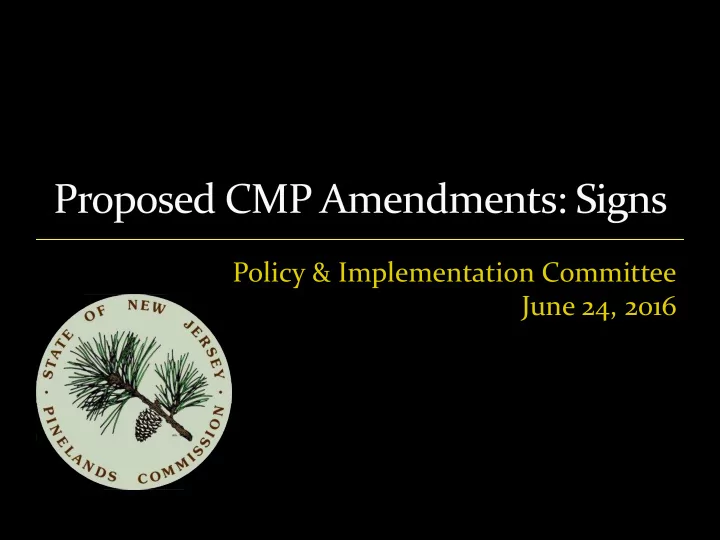

Policy & Implementation Committee June 24, 2016
1. Reorganized structure of the signage rules 2. Off-site signs 3. On-site signs 4. Electronic message displays
Current off-site sign types: Commercial Agricultural Commercial Establishments Directional Civil, Social, Political Activities
Off-site sign rules are substantially the same Lawfully existing off-site New off-site signs will be signs prior to CMP are permitted in: permitted in: RGA and Towns only w/ the use of RGA and Towns transferable sign right Villages and RDA (limited) Clarification of what signs are eligible for use in transfer program
“Special” off -site signs permitted in all management areas: Off-site Signs Advertising Commercial Agricultural Establishments Off-site directional signs Temporary
Current on-site sign types: Business Home Occupation All are exempt from Commission review Institutional Temporary For Rent/For Sale Trespassing/Private Property Official Public Safety/Information
Retain application exemption for all on-site signs 7:50-4.1 Applicability (a) For the purposes of this subchapter only, the following shall not be considered development except for development of any historic resource designated by the Pinelands Commission pursuant to N.J.A.C. 7:50- 6.154 …. 4. The construction, repair or removal of any sign, except for the construction or replacement of any off-site sign in accordance with N.J.A.C. 7:50- 6.108(a)3, 4 or 5.
Delegate regulatory control of on-site signs to municipalities 7:50-6.107 On-Site Signs (a) On-site signs may be permitted in any management area. (b) Municipalities are encouraged to adopt the standards for electronic message displays in N.J.A.C. 7:50- 6.109(a)3 and 4 in formulating municipal ordinance standards for on-site signs.
Why favor this approach? Municipalities are already the primary regulator of such signs due to the long-standing exemption The impacts are local and municipalities can adapt and respond more quickly to changing technologies and varying community values Municipalities will be able to regulate business signs on an equal basis with regard to on-site signs, regardless of management area
On-site signs primarily relate to on-site business. The permitted locations of such land uses are still dictated by Management Areas
Permitted at the option of the municipality for on-site and off-site signs Non-conforming off-site signs are not permitted to have EMD e.g., No EMD on non-conforming billboard in Forest Area or Preservation Area District CMP would contain standards for EMD on off- site signs Municipalities will be encouraged to apply CMP standards to on-site signs
Standards All off-site sign lighting will be required to be shielded or directed such that light is not directed towards the sky Additional standards related to: Default screen Transition Duration Brightness standards and dimmers
3. Off-site signs permitted pursuant to N.J.A.C. 7:50-6.108(a)4 and 5 may have electronic message displays provided that: i. The electronic message display is programmed to freeze in one position if a malfunction occurs; ii. The transition of one displayed message to another displayed message is accomplished within one second or less; iii. The duration of the interval between the end of any transition and the start of its subsequent transition is at least eight seconds; and iv. The municipality has adopted provisions governing the permitted brightness of the display at varying ambient light conditions and the brightness of the display is automatically adjusted based on ambient light conditions through the use of an integrated light sensing device. 4. Except as provided in (a)3 above, off-site signs shall not contain, include, or be illuminated by any flashing, intermittent, scrolling or moving light or lights. All sources of illumination shall be shielded or directed such that light is not directed towards the sky.
Why favor this approach? The P&I Committee has generally agreed that digital signs may be acceptable in certain limited circumstances. Leaves decisions on on-site signs to the municipalities as already discussed Provides limited opportunities for off-site signs to convert to Electronic Message Displays with additional standards
Impacts of Lighting Artificial Light At Night (ALAN) Studies all sources of light emission Impacts have been found on select species studied Policy Limitations Few studies on the impacts of signs alone Studies have focused on single species in controlled environments Lack of consensus on ecosystem scale impacts Science-based brightness standards for electronic signs have yet to be developed to address ecological impacts. Such signs should have less impact on night sky
1. Reorganized structure of the signage rules 2. Off-site signs 3. On-site signs 4. Electronic message displays
Recommend
More recommend